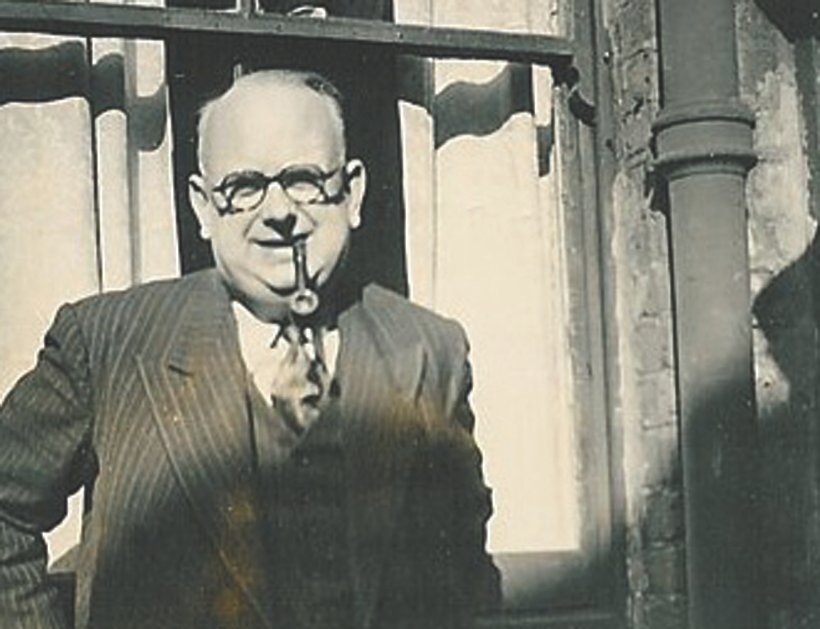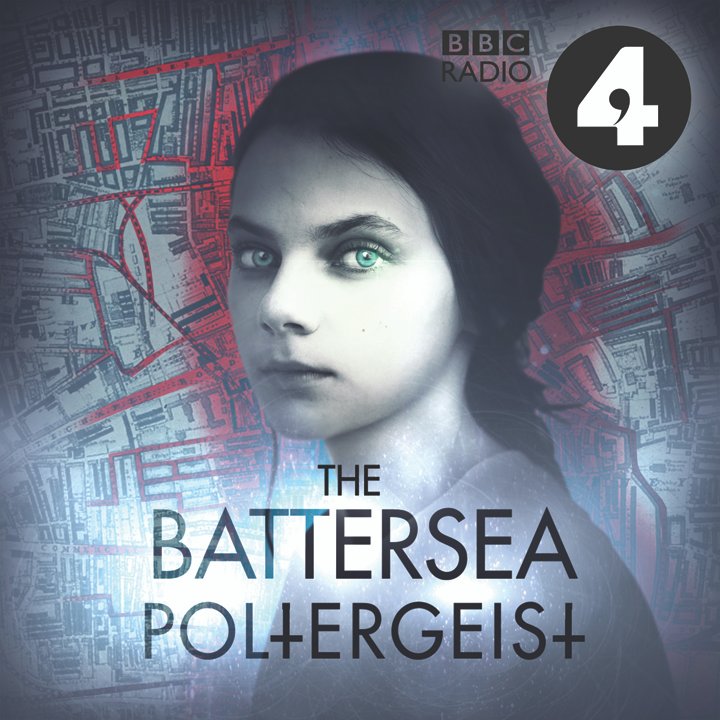‘Mum treated ‘Donald’ the poltergeist as a son’
A spook who terrorised a whole family in Battersea starting in 1956 is the subject of a hit podcast, listened so far by more than 3.5million people. New witnesses have reported further abnormal activity in the area where the house once stood. Is there something there, TOBY PORTER asks, or is it just a lot of drivel? You decide.
One night in January 1956, schoolgirl Shirley Hitchings heard loud banging, thumps and pounding around her family home in 63 Wycliffe Road, Battersea.
There was scratching from inside the furniture. The lights flashed on and off.
The neighbours complained about the noise.
Shirley, now 80, told the BBC: “It was as if the noises came from the bowels of the earth.
It went on until daylight. We were traumatised. I remember clinging to my dad, saying, ‘Please make it stop.”’
But it was just the start. The noises returned, night after night.
Over the next 12 years, it became one of the most chilling alleged hauntings in British history.
It was even discussed in Parliament.

The “spirit” – the family nicknamed it Donald, after Disney’s bad-tempered duck – dragged Shirley from her bed and made her levitate.
It set fires around the house and drew messages on the walls.
Shirley was accused at the time of causing the noises.
She lived in Wycliffe Road with her mum Kitty and dad Wally, a London Underground train driver, her Irish grandmother Ethel and adopted brother John, a surveyor in his 20s.
Shirley remembers the first night. “The whole house shook like it was an air raid,” she said. “It went on night after night for three weeks.
“We were shattered.”

The family called the cops and surveyors to find the causes but no one could explain it.
Objects started moving after three weeks. Slippers “walked” around the room and the piano played of its own accord.
Shirley’s glove flew from the floor and hit Wally in the face. Pots and pans flew from the kitchen, though no one was in there.
“They’d float towards you then speed up, so you’d have to duck,” said Shirley. “Or they’d hover and hit the wall.”
One night, Shirley’s bed sheets were dragged from her body.
Her family, woken by her screams, rushed in to try to put the sheets back on, but found themselves in a tug of war, with the sheet being pulled the other way.

Then Shirley went stiff, her back arched and she rose several inches from the bed.
Shirley recalled: “I was floating above the bed. When John pulled me down I was rigid. My nan, who was Catholic, thought I might be possessed by the devil. I thought I was going mad. I was crying all the time, very traumatised.”
By February the family were besieged by the press and curious neighbours.
Ghost hunter Harold Chibbett, known as Chib, devoted the rest of his life to the case.

He told the family they were dealing with a poltergeist – and there was usually a teenage girl at the centre of such activity.
“I was horrified,” Shirley recalled. “We were scared out of our wits. I thought, ‘This is the end. We’re all going to die’.”
The family arranged for Shirley to be “exorcised” at the home of Harry Hanks, a part-time medium who worked with Wally.
But the police also arrived to investigate “black magic and witchcraft” – and they witnessed some of the phenomena.

Hanks’s MP called for the police to issue an apology for the intrusion.
Chib suggested the family try to make contact with the poltergeist, using cards like a ouija board – Chib would point to a card with a letter and the spirit would tap when the right letters were reached to spell out words.
It began to “spell out” that he was French and scared.
Shirley said: “It didn’t make us feel sorry for him. We just told him to go.”
Messages appeared on the walls – “Viva France”.

Chib would leave paper and a pen in the family’s front room – the only one with a lock – and take the key home with him.
The room came to be known as “Donald’s room” because he would tap along to music on the television and arrange dolls in a circle.
In the morning, there could be 60 or 70 notes.
There are thousands in Chibs’s files. The first simply said, chillingly, “Shirley I come”.
Many more are illegible, or a strange mixture of French and English, sometimes addressed to “mon cherie Chibbett”.
He claimed to be the “lost dauphin” Louis Charles, heir to the throne of France, who died aged 10 of scrofula after the execution of his parents, Louis XVI and Marie Antoinette, during the French Revolution.
The letters from Donald contained facts few would have known, such as the names of Louis Charles’s bodyguards, later verified in Parisian archives by Chib.
For Shirley, the worst period was March 1956.

She said: “Donald started making demands – wanting me to wear my hair a certain way then threaten us, saying he’d set fires in the house.
Dad locked all the matches and knives in our air raid shelter. But it did no good. Fires would start all over the house.
One night Dad got burned putting out a fire. Underneath the burn were gouge marks, like he’d been clawed.”
“Donald” would try to push her grandmother Ethel down the stairs.
In October 1956, objects started to float around and the room filled with whispering.
An Irish voice was heard – and Ethel declared it was her mother’s. She spoke back. She had a stroke a few days later and died shortly afterwards.
Shirley was sacked from her part-time job as a seamstress in Selfridges when scissors disappeared and she was forced to admit she was the poltergeist girl.

In 1964, the family moved to Latchmere Road, a 15-minute walk away, but the activity followed her.
“It ruined my life,” Shirley said. “It took my teenage years. I was 21 before I could get anything near normality.
“And even then he interfered in my life. One boyfriend came to the house and was trying to goad Donald by saying things like, ‘Come on, Donald, do your worst.’ But he fled after a bowl was tipped on to his head.”
When she went out in a car with the man who would become her husband, she came home to find her mother with written messages from Donald, saying what they had been up to.
The last message came in 1968.
Shirley was living in West Sussex with her husband and baby son and Donald would leave messages on the notepad she kept by the telephone, telling her what her parents were doing back in London.

The note said he was leaving – and they never heard from him again.
Shirley said: “My mum went into mourning. She’d got to think of Donald like a son. But Dad and I were delighted.”
In the 1980s, a medium approached Shirley at a craft fair.
She said Shirley was being followed by “a little boy, in fancy dress – blue satin, and he’s got red hair”.
It’s a description Shirley recognised – Chib had once given her a postcard featuring Louis Charles wearing a blue satin suit with red hair.
Recently, at a psychic evening with her daughter, Shirley was given a message “from a boy who said he was sorry for all he’d done”.
Now a great-grandmother, Shirley said: “It’s all true. For me it was normal. It’s a lot for people to swallow. But it did happen.”
Parapsychologist Dr Ciaran O’Keeffe, who describes himself as ‘an open-minded sceptic’ said: “Not all of it is likely to be supernatural but nor is some of it easily explained.
“There are multiple witnesses; some events defy the laws of gravity. It’s arrogant not to keep an open mind.”
BBC podcast producer and presenter Danny Robins spent two years analysing the case, with the results on his Radio 4 podcast The Battersea Poltergeist, available on BBC Sounds.
He said: “It’s the closest I’ve come to proof that there is something more: that ghosts exist.
Speaking to Shirley sent a shiver down my spine. The real fear comes from the fact that Shirley is entirely ordinary. If it can happen to someone like her, it could happen to anyone.”
We would all like to believe there is something other than mundane reality – but surely by now, with so many camera phones out there, evidence of its existence would be indisputable.
Whatever, the podcast is to be turned into a TV series, so at least the mystery should provide good entertainment.
